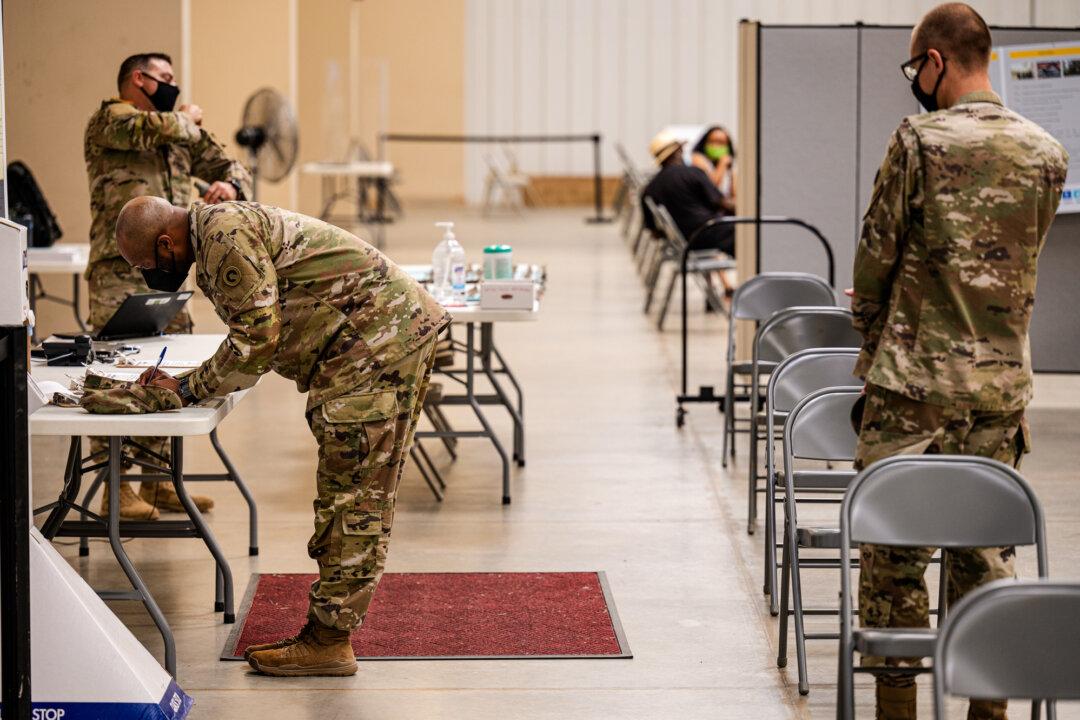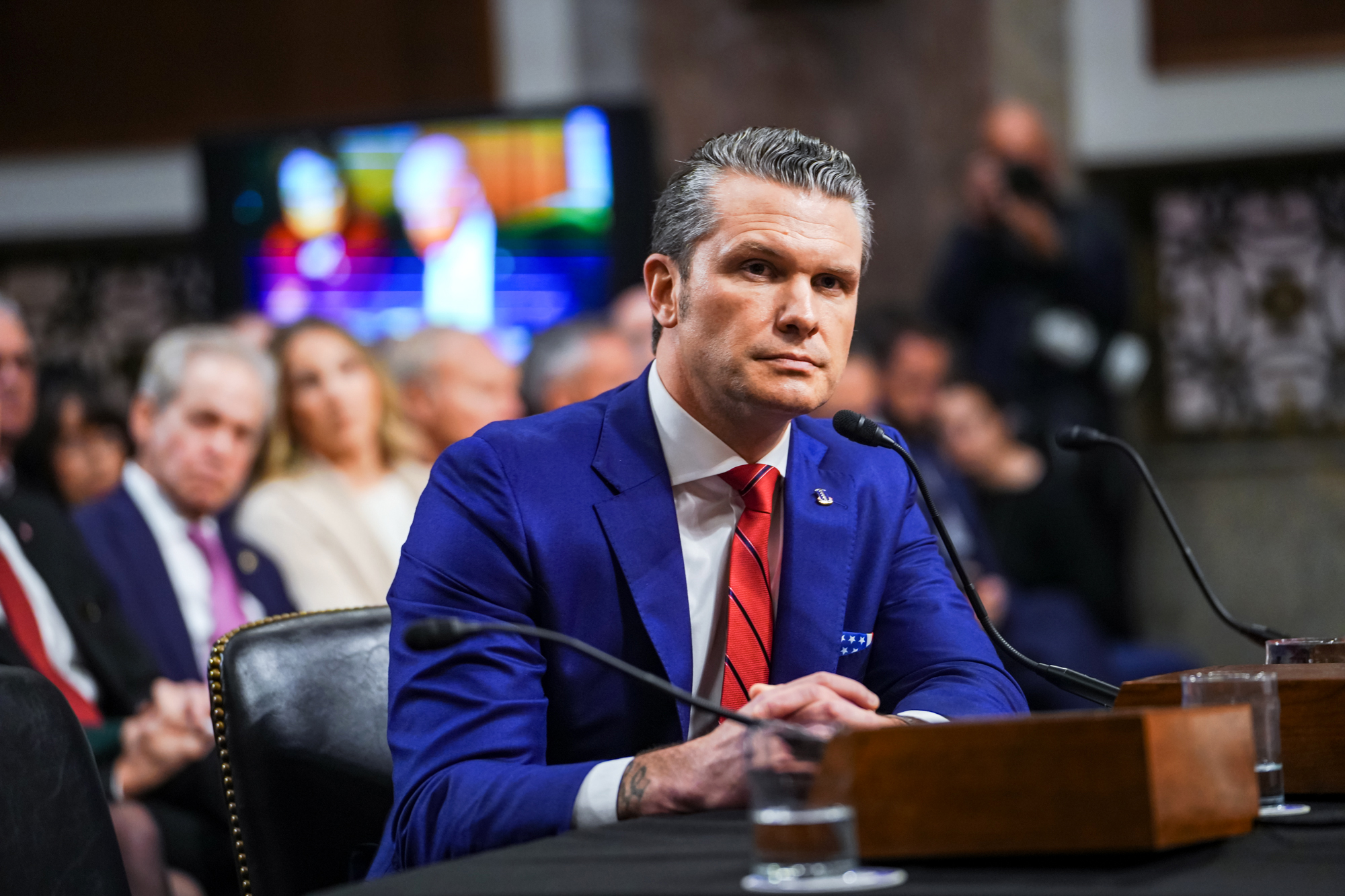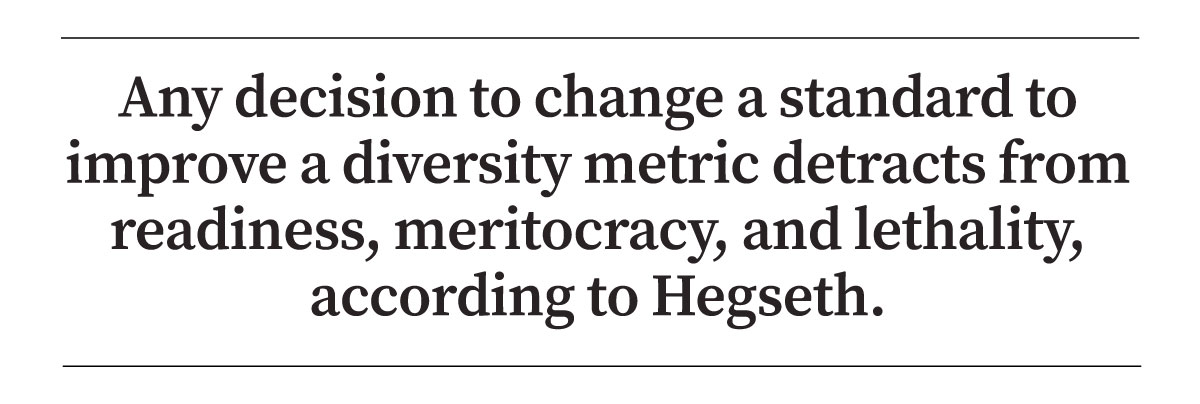Pete Hegseth appeared before the Senate Armed Services Committee on Jan. 14 to make his case to become the next secretary of the Defense Department.
Hegseth was the first of roughly a dozen of President-elect Donald Trump’s appointees slated to go before Senate committees this week and is considered one of the more controversial Cabinet selections.
That fact was on full display as Hegseth entered the crowded Senate chamber to raucous applause and chants of “U.S.A.” that were quickly followed by angry cries and accusations of support for genocide in the Middle East.
Such polarization continued through the single round of questioning afforded to lawmakers. Democrats pressed Hegseth on his professional experience and personal failings, while Republicans praised him for condemning “woke” politics in the military.
Here are some of the key takeaways from the hearing.
1. Hegseth Focuses on Military’s Warfighting Capability
Hegseth sought early on to quash fears that he would lead a witch hunt of Trump’s perceived political enemies in the ranks.
He said both he and Trump would seek to focus on improving the warfighting capability of the military without regard for the political affiliations of its servicemembers.
“[Trump], like me, wants a Pentagon laser-focused on lethality, meritocracy, warfighting, accountability, and readiness,” Hegseth said in his opening remarks.
“We will remain patriotically apolitical and stridently constitutional.”
When pressed on previous comments in which he blamed Democrats and leftists for much of the military’s perceived failings, Hegseth acknowledged that the incoming Trump administration would remove many officers from their positions but said removals and promotions would be based on merit.
Hegseth said he would seek to reestablish “real deterrence” for the American homeland, beginning with the southern border and expanding to operations against China in the Indo-Pacific as part of a wider Trump administration push toward a “peace through strength” foreign policy.
To that end, Hegseth said that he would “bring the warrior culture back” to the Pentagon, which he said has become less capable of fighting and winning wars and places rule-following above operational success.

President-elect Donald Trump's nominee for Secretary of Defense, Pete Hegseth, testifies during his Senate Armed Services confirmation hearing at the U.S. Capitol on Jan. 14, 2025. (Anna Moneymaker/Getty Images)
2. Pressed on Qualifications
Democratic lawmakers questioned Hegseth’s professional record, noting that he has never led an audit, has never driven costs down for an organization, has never conducted acquisition or reform initiatives, has never led international security negotiations, and appeared largely unaware of regional issues in the Indo-Pacific, where the military is engaged in confronting communist China.
Sens. Gary Peters (D-Mich.) and Tammy Duckworth (D-Ill.) suggested that Hegseth was demanding that the Department of Defense raise standards on its servicemembers while seeking to lower standards for himself.
“I don’t know of any corporate board of directors that would hire a CEO for a major company if they came and said, ‘You know, I supervised a hundred people before,’” Peters said.
“I don’t think there’s a board of directors in America that would hire you as CEO with the kind of experience you have on your résumé.”
Hegseth addressed concerns about his qualifications by noting that he was building “one of the best possible teams” imaginable to help him lead the Pentagon.
“The only reason I’ve had success in life, to include my wonderful wife, is because of people more capable around me and having that self-confidence to empower them and say: ‘Hey, run with the ball. Run with the football. Take it down the field. We’ll do this together. I don’t care who gets the credit,’” he said.
“And in this case, that’s how the Pentagon will be run.”
3. Women in Combat
Hegseth’s views on women in the military were also a recurring topic of discussion during the hearing.
In a Nov. 7, 2024, interview with podcast host and former Navy SEAL Shawn Ryan, Hegseth noted that he supports women servicemembers who contribute to the military, but he later said, “I’m straight up just saying we should not have women in combat roles.”
Hegseth attempted to temper that viewpoint during the hearing, saying he would not seek to bar women from combat roles but remains opposed to lowering standards to make those roles more accessible.
At present, women in combat occupations are required to perform to the same training standards as men but have lower physical standards in service-wide annual training assessments.
Sen. Jeanne Shaheen (D-N.H.) compared Hegseth’s comments made to Ryan with comments he’s made since Trump announced his nomination, in which Hegseth has said that he supports all women who contribute across the U.S. military, including in combat.
“What I’m confused about, Mr. Hegseth, is, which is it?“ she said. ”Why should women in our military, if you were the secretary of defense, believe that they would have a fair shot and an equal opportunity to rise through the ranks?”

U.S. Army trainees attend their graduation ceremony after basic training at Fort Jackson, a U.S. Army training center, in Columbia, S.C., on Sept. 29, 2022. (Scott Olson/Getty Images)
Sen. Tom Cotton (R-Ark.) used part of his speaking time to reframe the debate around women in combat, asserting that although women have seen combat through support roles over the years, Pentagon policy has only changed in the past decade to allow women in specific combat specialties such as infantry, artillery, and special operations.
Hegseth said any decision to change a standard to increase a diversity metric detracts from readiness, meritocracy, and lethality.
“That’s the kind of review I’m talking about, not whether women have access to ground combat,” he said, saying that commanders “meet quotas to have a certain number of female infantry officers or infantry enlisted.”
The Pentagon maintains no such policy.
4. Pledge to Reinstate Members Who Refused COVID-19 Vaccine
Falling in line with a key Trump promise, Hegseth also vowed that all servicemembers who were involuntarily removed from service for refusing the COVID-19 vaccination would be reinstated with back pay.
“Not only will they be reinstated, they will receive an apology, back pay, and rank that they lost because they were forced out due to an experimental vaccine,” Hegseth said.
About 3,400 troops were discharged from service for refusing the vaccine, according to Sen. Rand Paul (R-Ky.).
The Department of Defense mandates nine other vaccines for all servicemembers, as well as an additional eight depending on occupational specialty or region of deployment, but it rescinded the COVID-19 vaccination requirement in 2023.
Despite this, current Secretary of Defense Lloyd Austin has thus far refused to reinstate those who were pushed out of service at the time.
It is unclear what the total cost of back pay for the thousands of troops discharged would be or whether it would receive bipartisan support. A bill introduced by Sen. Ted Cruz (R-Texas) in 2023 sought to achieve the same end, but it was never passed.

Soldiers file paperwork before receiving a COVID-19 vaccination by Army Preventative Medical Services in Fort Knox, Ky., on Sept. 9, 2021. The Pentagon, under President Joe Biden, mandated COVID-19 vaccinations for all military service members in early September 2021. (Jon Cherry/Getty Images)
5. Alcohol Use, Sexual Assault Accusations
Much of the hearing went beyond military policy to questions concerning Hegseth’s personal conduct over the years, including allegations of alcohol abuse and sexual assault.
Addressing the alcoholism allegations, Hegseth has said that he would commit to sobriety for the duration of his time as defense secretary if confirmed for the role but would not commit to resigning if he were to go back on that pledge.
Addressing the sexual assault claims, he has said that a 2017 incident was consensual and further noted that law enforcement investigators entirely cleared him of wrongdoing.
Sen. Mazie Hirono (D-Hawaii) said she didn’t feel it was accurate to say Hegseth was completely cleared of the 2017 sexual assault allegation and noted that Hegseth and his accuser had made a nondisclosure agreement to settle the matter.
During the hearing, Hegseth frequently dismissed the drinking claims as arising from anonymous sources. In one particular exchange, Sen. Tim Kaine (D-Va.) said he was aware of named sources backing the drinking allegations.
“I know you’ve denied these things, but isn’t that the kind of behavior that, if true, would be disqualifying for somebody to be secretary of defense?” Kaine asked.

(L–R) Senate Armed Services Committee Chairman Sen. Roger Wicker (R-Miss.), Sen. Tim Kaine (D-Va.), and Ranking Member Sen. Jack Reed (D-R.I.) speak during a confirmation hearing for President-elect Donald Trump's nominee for Secretary of Defense, Pete Hegseth, at the U.S. Capitol on Jan. 14, 2025. (Andrew Harnik/Getty Images)
“Anonymous, false charges,” Hegseth said in response.
At another point, Kaine asked Hegseth to state whether someone would be disqualified from serving as a defense secretary if he or she had committed sexual assault. Hegseth reiterated that the 2017 claim against him was false and stemmed from a consensual encounter and dismissed the question as hypothetical.
During his speaking time, Sen. Markwayne Mullin (R-Okla.) turned the questions of drinking and infidelity on his fellow lawmakers.
“How many senators have shown up drunk to vote at night? Have any of you guys asked them to step down and resign from their job?” Mullin asked.
“And then how many senators do you know have [gotten] a divorce before cheating on their wives? Did you ask them to step down? No, because it’s for show.”


















